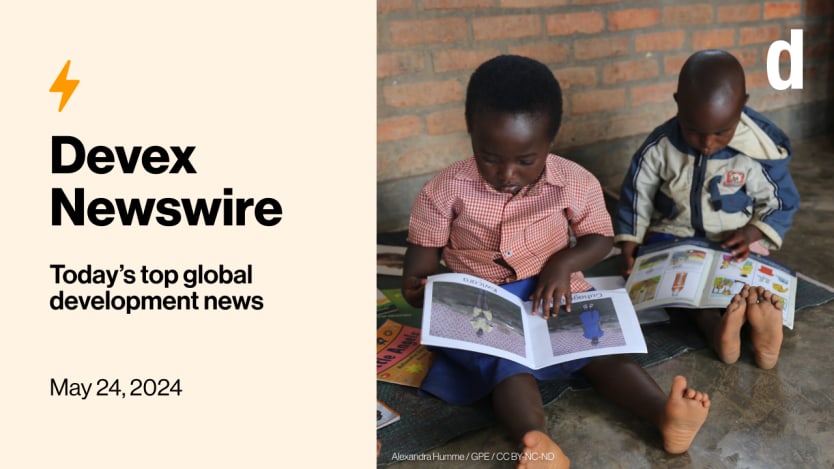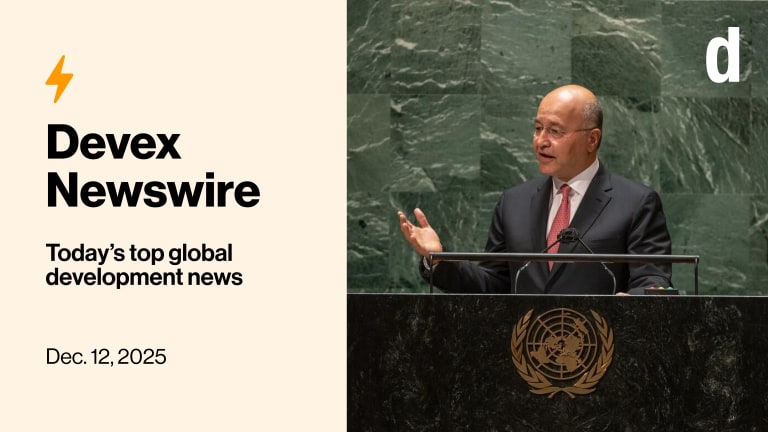
Two innovative new funds will launch in Rwanda and Sierra Leone to improve early education — but the funding from donors will be tied to achieving specific results.
Also in today’s edition: Philanthropy’s “New Deal,” the pandemic’s secret negotiations, and Kenya’s president visits the U.S. to bolster Africa engagement.
Early days
Rwanda and Sierra Leone will host two pioneering funds to expand access to quality early childhood care and education through results-based financing, where implementers are paid only upon achieving independently verified successful results.
This is a preview of Newswire
Sign up to this newsletter for an inside look at the biggest stories in global development, in your inbox daily.
The model is designed to drive innovation — and be cost-effective for donors, a crucial advantage given the funding shortfall in global education and the declining state of learning post-pandemic.
The programs will cost $15 million each over four years, Sophie Edwards writes for Devex, with 10% provided by host governments and the LEGO Foundation and other investors providing the rest.
“We have to try something different because while COVID-19 may be over, the repercussions are still being felt and this is compounded by the dire situation in education financing and also the growing mental health crises among young people,” Amel Karboul, CEO of the Education Outcomes Fund, which designed the programs, tells Sophie.
Early childhood care and education are often neglected by donors and governments, especially in low- and middle-income countries. Despite evidence that early-years programs enhance future performance, only 60% of preschool-age children worldwide are enrolled, dropping to 1 in 5 in low-income countries, with quality standards often inconsistent.
Read: Results-based funds aim to boost preschool access in Rwanda, Sierra Leone
ICYMI: How results-based financing failed to live up to the hype (Pro)
+ May is the last month to take advantage of early-access pricing for Devex World! Join us on Oct. 24 in Washington, D.C. to connect with leaders tackling the urgent themes redefining global development.
You’ll hear from leaders in the global education space such as Teach For All’s Wendy Kopp and United World Colleges’ Musimbi Kanyoro, and more. Get your ticket by May 31 before prices increase
Parting words
Mark Malloch-Brown, outgoing head of the Open Society Foundations, predicts that major philanthropies will be pushed to the side as governments step up to tackle global crises — reminiscent of former U.S. President Franklin D. Roosevelt's New Deal response to the Great Depression.
The current era is on the cusp of a crunch moment that mirrors the Great Depression, which sparked a realization that only governments could tackle emergencies on a scale beyond the efforts of the Rockefeller, Ford, and Carnegie foundations, he said at a London event attended by my colleague Rob Merrick.
The scope of today's societal challenges is too vast for foundations alone to resolve, he said. “Foundations are going to be somewhat eclipsed,” he asserted, citing the COVID-19 pandemic as a case where foundations struggled to fill the void left by governments. “People are going to say, ‘nice lot of people, but simply not big enough, not accountable enough, not systematic enough, to deal with what's going wrong with our country,’”
Malloch-Brown will hand over leadership of OSF on June 1.
Read: Philanthropy will be ‘eclipsed’ by big government, says Malloch-Brown (Pro)
ICYMI: OSF names new president as Mark Malloch-Brown steps down
Related reading: What is polycrisis philanthropy? (Pro)
+ Not yet a Devex Pro member? Start your 15-day free trial today to access all our exclusive reporting and analyses, the world’s largest global development job board, and the Weekender — a special Sunday newsletter covering our industry’s big moves for Pro members.
Backroom deals
During the height of the COVID-19 pandemic, confidential contracts reveal that multinational drug companies, including Moderna and Pfizer, imposed stringent conditions on the South African government in vaccine negotiations.
Moderna prohibited the disclosure of ongoing talks, while Pfizer rejected efforts for accountability on late or incomplete deliveries and transparency. Fatima Hassan, founder of the Health Justice Initiative, or HJI, slammed the demands for undermining democracy by preventing parliamentary and watchdog oversight.
The South African High Court granted HJI unprecedented access to all COVID-19 vaccine procurement contracts and correspondence in August 2023, following a lawsuit arguing public interest. Documents released in September showed South Africa paid higher prices for vaccines from the Serum Institute and Johnson & Johnson than the European Union and the African Union.
The new documents cover communications with manufacturers and funders including Serum, Jannsen, AstraZeneca, Gavi, the Vaccine Alliance, and the EU’s Solidarity Fund, writes Andrew Green for Devex.
The newly released documents indicate that South African officials attempted to negotiate with the drug companies, “but could not overcome their concentrated power,” says Jishian Ravinthiran, a researcher with Public Citizen, which worked with HJI to analyze the material.
Read: How Big Pharma kept COVID-19 vaccine negotiations in South Africa secret
ICYMI: Big Pharma 'bullying' exposed in South African COVID-19 contracts
+ For the latest insider reporting on global health, be sure to sign up to Devex CheckUp, a free, Thursday newsletter.
Ruto does DC
Kenyan President William Ruto’s state visit to Washington, D.C yesterday focused on three big themes: democracy, trade, and investment, and the East African nation moving from being a partner on regional issues to a partner on global issues, including debt and climate change.
Ruto said he and U.S. President Joe Biden discussed “the significant opportunity for the U.S. to radically recalibrate its strategy and strengthen its support for Africa” by investing in African institutions and peace and security.
He called on the U.S. to help African nations struggling to deal with multiple shocks like extreme climate events, debt distress, and global conflict spillover. To that end, the two presidents announced a commitment to help countries address debt, largely through a boost in funding to international financial institutions.
That commitment, dubbed the Nairobi-Washington Vision, was one of several announcements, among them the U.S.-Kenya Climate and Clean Energy Industrial Partnership to bolster cooperation on clean energy, supply chains, and green industrialization. There was also $250 million in investments by the U.S. International Development Finance Corporation and the launch of the Millennium Challenge Corporation’s $60 million Kenya Urban Mobility and Growth Threshold Program.
As Biden and Ruto headed to numerous official White House events, Devex Senior Reporter Adva Saldinger caught up with U.S. Sen. Cory Booker, a Democrat who chairs the Senate foreign relations subcommittee on Africa, about the visit, which he called “extraordinary.” Ruto’s leadership on global affairs, including Haiti and counterterrorism, are important in shifting the focus of the relationship with Kenya, he said.
“His voice on just engagement with Africa, seeing Africa not as something that Americans should think of as charity but as mutual interest, interwoven economic destinies and really the promise for a brighter future,” Booker told Adva.
While that may be the case, questions remain about just how much the U.S.-Africa relationship has changed. Booker acknowledged more can be done, like investments and “advocating for more fairness when it comes to the global lending markets, when it comes to trade, things that we could do to really create more empowerment on the continent.” He’s working on a suite of bills that would address some of those issues, he said.
Related reading: US Sen. Chris Coons on Kenyan president’s visit, Africa policy and trade
+ Listen: Adva talked about Ruto’s visit and another big development in Congress this week — the U.S. farm bill — in the latest episode of our This Week in Global Development podcast, which was hosted by Devex Managing Editor Anna Gawel, and also featured David Barth, the vice president of international programs at Save the Children.
In other news
South Asia is facing extreme weather, with nine suspected heat stroke deaths in western India and a cyclone threatening Bangladesh. [Reuters]
The Italian government expressed support for an ambitious new plan to boost imports of cheap green energy from North Africa to Europe. [Bloomberg]
The World Bank revealed Lebanon’s poverty has tripled in the past decade, while the head of a visiting IMF mission highlighted the compounding economic strain from the country's refugee crisis, border conflicts with Israel, and the spillover from the war in Gaza. [Al Jazeera]
Update, May 30, 2024: This article has been updated to clarify the name of the Education Outcomes Fund.
Sign up to Newswire for an inside look at the biggest stories in global development.








